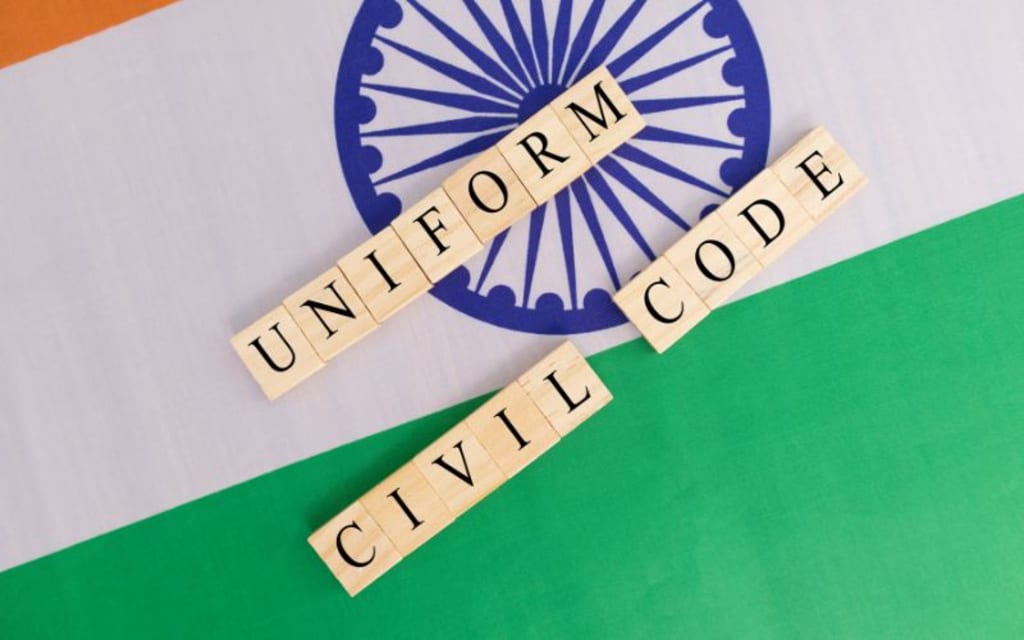Law Commission of India UCC Voting
A Step Towards Uniformity and Equality

Introduction to the Law Commission of India
The Law Commission of India is a statutory body that was established in 1955 by an order of the Government of India. Its main objective is to review and suggest reforms in the Indian legal system. The Commission consists of a Chairman and several members who are legal experts and professionals in various fields. The Law Commission of India plays a crucial role in shaping the legal landscape of the country and ensuring that the laws are in line with the needs of society.
Understanding the Uniform Civil Code (UCC)
The Uniform Civil Code (UCC) refers to a set of laws that govern personal matters such as marriage, divorce, inheritance, and adoption for all citizens of India, irrespective of their religion. Currently, personal laws in India are based on religious practices and are applicable to individuals belonging to different religious communities. The UCC aims to bring uniformity and equality in personal laws by providing a common set of rules for all citizens.
The need for a Uniform Civil Code in India
There are several reasons why a Uniform Civil Code is needed in India. Firstly, it promotes equality and non-discrimination among citizens by ensuring that everyone is subject to the same set of laws. Currently, different religious communities have different laws relating to personal matters, which can lead to unequal treatment of individuals. A Uniform Civil Code would eliminate this inequality and ensure that all citizens are treated equally under the law.
Secondly, a Uniform Civil Code would simplify the legal system by bringing all personal laws under one umbrella. This would make it easier for individuals to understand and navigate the legal system, as they would not have to refer to different laws based on their religion. It would also streamline the judicial process by reducing the complexity and burden of dealing with multiple personal laws.
The role of the Law Commission of India in the UCC voting process
The Law Commission of India plays a crucial role in the voting process for the Uniform Civil Code. It is responsible for studying and analyzing the need for a UCC, as well as the feasibility of implementing it. The Commission conducts extensive research, consults with experts and stakeholders, and prepares a comprehensive report with recommendations.
Once the report is prepared, the Law Commission presents it to the government, which then decides whether to accept or reject the recommendations. The government may also seek public opinion on the matter before making a final decision. The Law Commission's report serves as a guiding document for the government in formulating policies and laws related to the Uniform Civil Code.
Arguments in favor of the UCC
There are several arguments in favor of implementing a Uniform Civil Code in India. Firstly, it promotes gender equality by ensuring equal rights and opportunities for men and women in personal matters. Currently, different personal laws discriminate against women in areas such as marriage, divorce, and inheritance. A Uniform Civil Code would eliminate these discriminatory practices and provide equal rights to all citizens, regardless of their gender.
Secondly, a Uniform Civil Code would promote national integration and social cohesion by fostering a sense of unity among citizens. India is a diverse country with people belonging to different religions and cultures. Having a common set of laws for personal matters would help bridge the divide among different communities and promote a sense of belonging to a unified nation.
Arguments against the UCC
While there are arguments in favor of a Uniform Civil Code, there are also concerns and arguments against its implementation. One of the main arguments against the UCC is that it infringes upon the right to religious freedom. Personal laws based on religious practices have been followed in India for centuries, and some argue that imposing a common set of laws would undermine the cultural and religious diversity of the country.
Furthermore, implementing a Uniform Civil Code requires careful consideration and sensitivity towards the diverse religious and cultural practices in India. There is a fear that a one-size-fits-all approach may not be suitable for a country as diverse as India and may lead to unintended consequences and conflicts.
The significance of the Law Commission's voting on the UCC
The Law Commission's voting on the Uniform Civil Code holds great significance as it reflects the collective opinion and expertise of legal professionals and experts in the country. The Commission's vote serves as a valuable input for the government in making informed decisions regarding the implementation of a Uniform Civil Code.
The Law Commission's vote also generates public discourse and awareness about the need for a Uniform Civil Code. It provides a platform for different perspectives to be heard and debated, leading to a more comprehensive understanding of the issue.
Public opinion on the UCC
The question of whether to implement a Uniform Civil Code in India has been a subject of debate and discussion among the general public. Different sections of society have varying opinions on the matter, influenced by factors such as religion, culture, and personal beliefs.
While some sections of society support the idea of a Uniform Civil Code and believe that it would promote equality and unity, others have concerns about its impact on religious freedom and cultural diversity. Public opinion plays a crucial role in shaping government policies, and the views expressed by the public are taken into consideration during the decision-making process.
Challenges and controversies surrounding the UCC voting
The voting process for the Uniform Civil Code is not without its challenges and controversies. The issue of personal laws and their reform is deeply intertwined with religious and cultural sentiments. Any attempt to change or replace these laws is met with resistance and opposition from various religious groups.
Political considerations also play a significant role in the UCC voting process. Different political parties have different ideological positions on the issue, and their stance may influence the outcome of the voting process. Balancing the interests of different stakeholders and addressing their concerns is a challenging task for the Law Commission and the government.
Conclusion: The future of the UCC in India
The question of whether to implement a Uniform Civil Code in India is a complex and sensitive issue that requires careful consideration and deliberation. While there are arguments in favor of the UCC, there are also concerns and challenges that need to be addressed.
The Law Commission of India plays a crucial role in studying and analyzing the need for a Uniform Civil Code and providing recommendations to the government. The Commission's voting on the UCC reflects the collective opinion of legal experts and professionals and serves as an important input for the government in making informed decisions.
The future of the Uniform Civil Code in India depends on various factors, including public opinion, political considerations, and the ability to address the concerns and challenges surrounding its implementation. It is a topic that will continue to generate debate and discussion as India strives for uniformity and equality in its legal system.
About the Creator
Hasan
Welcome...
In this site of mine you can learn amazing things and many information that you don't know so please subscribe to my site.
Enjoyed the story? Support the Creator.
Subscribe for free to receive all their stories in your feed. You could also pledge your support or give them a one-off tip, letting them know you appreciate their work.






Comments
There are no comments for this story
Be the first to respond and start the conversation.